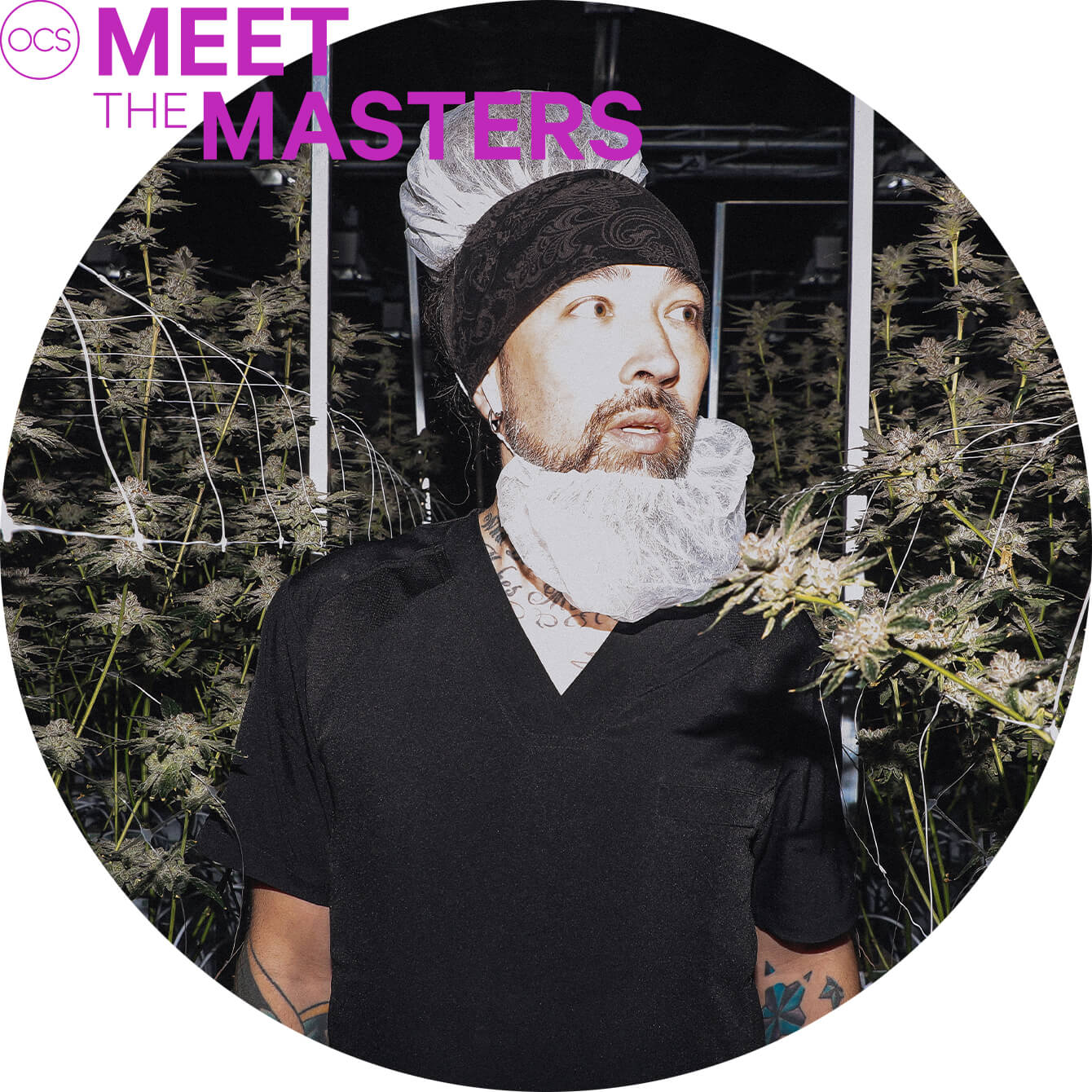Choosing Cannabis Products
Meet the Masters: Drew Lian, Carmel
Step into Carmel’s grow rooms with master grower Drew Lian to see how the company turns unique and rare cultivars into buzzy bestsellers.
Last updated August 22, 2023 | Published on May 10, 2022

Carmel Cannabis master grower Drew Lian didn’t think he’d ever join the legal industry. But after seeing what products were on the market in the early days of legalization, Lian started to think that with his obsession for rare genetics and his painstaking approach to quality, he could bring a unique brand of handcrafted cannabis products to the table.
He shared his aspirations with a few pals. Amazingly, two friends from different social circles had connections to Carmel’s co-founders, Roey Fishman and Dustin Laren, who happened to be looking for a master grower. In 2017, Fishman, Laren and Lian met at the site of what would become Carmel’s headquarters in Oro Station, a rural area east of Barrie on Lake Simcoe, and they immediately found common ground. They agreed that rather than mass-produce well-known cultivars, they’d blaze a trail, focusing instead on rare genetics grown in small batches.
“We love being different,” Lian says.
The approach has paid off. In early 2021, about a year after joining the market, Carmel launched Animal Face, a high-THC, sativa-dominant strain with a cult following in the legacy market for its indica-like effects. It quickly became a bestseller and customer favourite — selling out multiple times in its first few months — and earned Carmel a reputation as a Licensed Producer to watch. Not that Carmel is a one-hit wonder — their loyal following is also thanks to products like Dim Mac, Sorbetto and MAC 1.
“All of the plants get touched multiple times throughout the grow. That’s what we were doing in the legacy market, and that’s why the product was so good.”
Lian’s passion for cultivars is key to Carmel’s success. From strain selection to phenotyping, it’s a labour of love, focused on bringing something that resonated in the legacy market to the legal market.
“We shine on the genetics,” says Lian, who was collecting interesting seeds for 15 years before joining Carmel. “We don’t take credit for the genetics that we launched. We don't rename genetics. We tell it like what it is.” In the case of Animal Face, with its notes of gas, cake and lemon, California breeder Seed Junky Genetics is credited with creating the cultivar by combining Face Off OG with Animal Mints.

Just as important as what they grow is how they grow. Carmel’s cultivation facility is set up like eight micro-cultivators — eight 2,400 square-foot flower rooms, each with 65 lights and a canopy of 2,000 square feet. Twice during the growing process, Lian and his six-person team prune (also known as “lollipopping”), de-leaf and add trellises.
“All of the plants get touched multiple times throughout the grow. That’s what we were doing in the legacy market, and that’s why the product was so good,” says Lian, adding that at Carmel, no plants are irradiated. “In the larger scale facilities, you transplant the plant, you put it in the [grow] room and you don’t come back until harvest.”

At Carmel, Lian combines that legacy market process with legal market advantages. Lian now has access to sophisticated tools, like the AROYA sensor system and production platform, which give him real-time insights into factors like temperature, nutrients, lighting and more. “It’s my favourite toy right now.”
The hands-on approach continues at harvest time. As a craft producer, Carmel’s cannabis is harvested by hand and hang dried. “The quality that we achieve is very labour-intensive,” Lian says. Forty employees assist with trimming the plants by hand before they’re cold-cured and then later packaged, again by hand.
Carmel brings the same attention to detail to other departments beyond cultivation. It took the company longer than they expected to launch pre-rolls, for example, because they took their time deciding what shape and size the filters should be, how much each pre-roll should contain and how to ensure the joint wouldn’t canoe (burn faster on one side than the other). They wanted to get it exactly right.

While he’s quick to celebrate the wins, Lian is equally forthcoming when it comes to the company’s challenges. Despite Carmel’s efforts to educate consumers on how higher terpene concentration can deliver great cannabis experiences even when the THC potency is lower, it’s been difficult to sell Ontarians on the concept; in Lian’s experience, many consumers only consider high THC potency when shopping.
“A lot of the beautiful strains that we're looking at, we just can’t bring to market because the number is too low, despite [them] being prettier than anything else that we have in market right now or something even more unique,” Lian explains. “Something that we’re super excited about just won’t move.”
“I’m just challenging all the other growers to push themselves to the limit. Let’s make legal weed fun and exciting and top shelf.”
What they did bring to market this spring is Billy’s Pheno, a cross between GSC and Animal Face with a unique terpene profile named after Carmel’s flower manager and in-house “flower snob” Billy Hillier. Other new drops include a tobacco-free blunt containing their Tiger Cake dried flower and infused with Animal Face ice-water hash, a solventless concentrate. The infusion is wrapped in a king palm, which has fewer preservatives than conventional blunt wraps. “It’s a leaf, so it’s all organic,” Lian explains.
Despite already earning a lot of credibility this past year, Lian said there’s still room to grow — both at Carmel, where they hope to expand their grow capacity to reach consumers outside of Ontario, and in the industry as a whole.
“I’m just challenging all the other growers to push themselves to the limit,” he says. “Let’s make legal weed fun and exciting and top shelf.”







